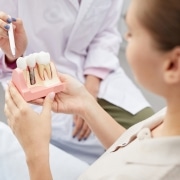3 Signs of Trouble After a Tooth Extraction
Just had a tooth extraction in Fort Collins, CO? While this is one of the most commonly performed dental procedures, a tooth extraction does not come without a few risks. Take a look at a few signs that something may be wrong after you have had a tooth pulled at the dentist.
Excessive bleeding
Once your tooth is pulled, there will be some bleeding. However, within a few hours, a blood clot should start to form within the open socket. If the blood clot does not form, you may experience excessive or prolonged bleeding. This issue can lead to a painful situation known as dry socket and should be treated right away.
New pain at the extraction site
It is perfectly normal to have a bit of pain after you get a tooth pulled. For the most part, over-the-counter pain relievers will help soothe the discomfort. However, if you suddenly start to experience some new level of pain, it could be a sign that something is wrong. For example, if you suddenly experience severe pain several hours after extraction or even the next day, you may be dealing with a dry socket.
Pain in the jaw
When a tooth is pulled, the dentist applies pressure to the tooth to dislodge it from the jaw bone. For most people, this procedure does not lead to any further issues with the jaws. However, older patients or those with weakened jawbones may sustain a jaw fracture. This problem most often comes along with pain around the jaws.
Visit a Fort Collins, CO Dentist Right Away
Even though tooth extractions generally heal just fine after the procedure, occasionally, a problem arises and a Fort Collins dentist should take a look. If you suspect something is wrong after getting your tooth pulled, reach out to us at Radiant Dental Health for help.







